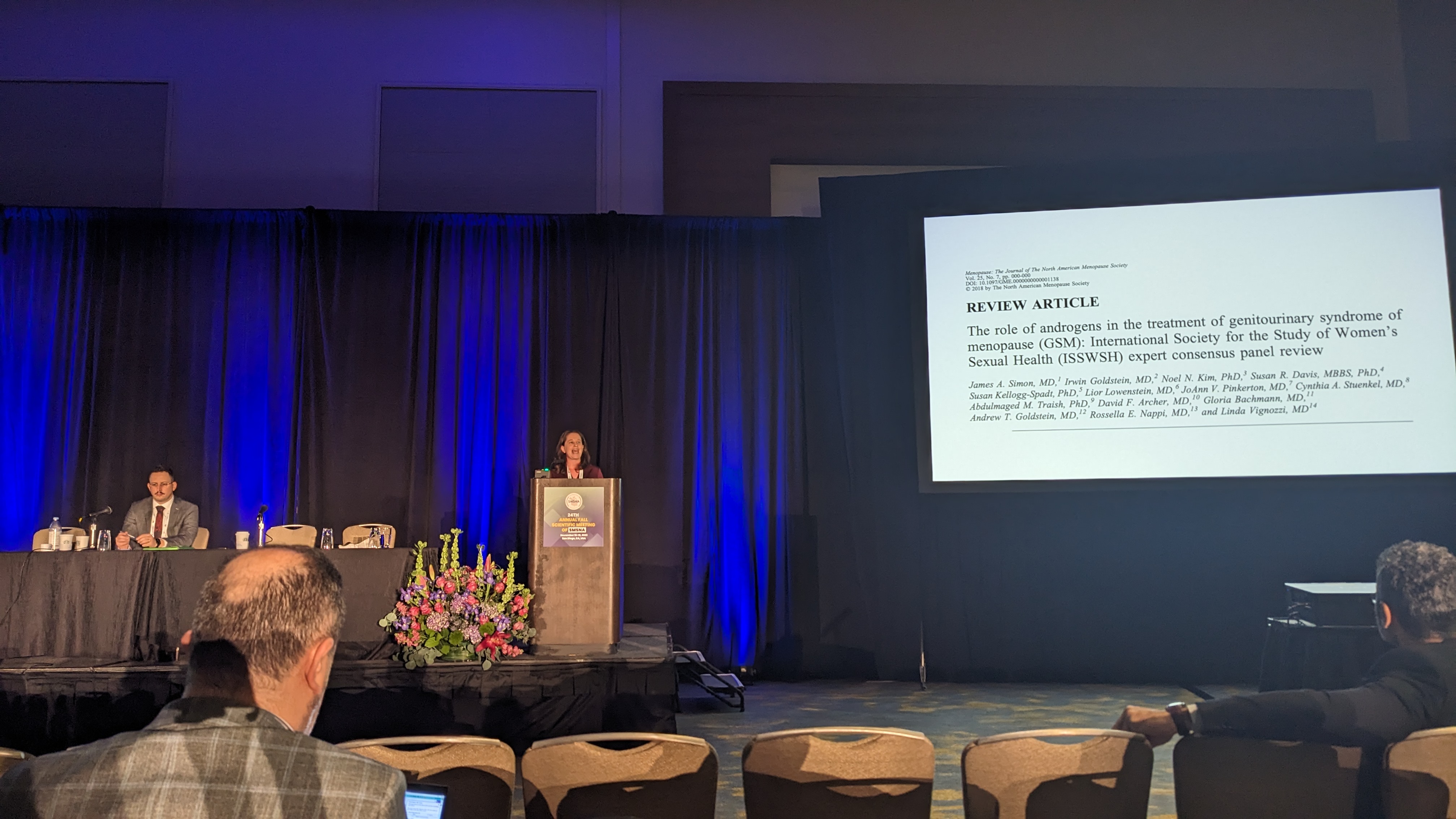At the 24th Annual SMSNA Fall Scientific Meeting, Dr. Rachel Rubin spoke on the topic "Couples Approach to Testosterone Therapy," advocating the idea that "couples who testosterone together stay together." While the American Urological Association (AUA) Guideline on Testosterone Deficiency supports testosterone replacement therapy for men with low testosterone levels, Dr. Rubin highlighted the limited support for testosterone therapy in women, particularly in improving their sexual health and overall well-being.
She emphasized that menopause involves more than just hot flashes and night sweats, extending to symptoms such as joint pain, low libido, increased urinary tract infections (UTIs), and even heart palpitations. These diverse symptoms may be linked to decreasing testosterone levels in women entering menopause. Understanding the hormone sensitivity of genital structures, Dr. Rubin shared that testosterone deficiency could lead to problems for women.
The presentation shed light on evidence supporting the effectiveness of testosterone therapy for women in addressing conditions like hypoactive sexual desire disorder (HSDD), hormonally mediated vestibulodynia, and other sexual health issues. Dr. Rubin's insights contribute to the growing understanding of the role of testosterone therapy in enhancing the well-being of both men and women, emphasizing the importance of considering hormonal factors in addressing various aspects of sexual health.
You may also be interested in...
Other Popular Articles

What Is the Average Penis Size?
If you have ever wondered how your penis compares to others in terms of size, you are not alone. Many men are curious to know how their penises stack up compared to the average. Unfortunately, general curiosity can sometimes give way to full-on obsession and anxiety about penis size. This can be an unhealthy and often unnecessary fixation, especially because most men who think their penises are too small have perfectly normal-sized penises.

What Is Jelqing, and Does It Actually Work?
The term “jelqing” refers to a set of penis stretching exercises that some believe can make the penis bigger. Although the practice has gained attention and popularity in blogs and internet forums in recent years, there is no scientific evidence that it is an effective way to permanently increase the size of one’s penis. In fact, in some cases, jelqing may actually cause damage to the penis, so it is a good idea to get all the facts before setting off to try it.

What Is Sensate Focus and How Does It Work?
Sensate focus is a technique used to improve intimacy and communication between partners around sex, reduce sexual performance anxiety, and shift away from ingrained, goal-oriented sexual patterns that may not be serving a couple.

Can Sex Reduce Menstrual Cramps?
The SMSNA periodically receives and publishes ‘guest editorials.’ The current article was submitted by Mia Barnes, a freelance writer and researcher who specializes in women's health, wellness, and healthy living. She is the Founder and Editor-in-Chief of Body+Mind Magazine.
Having sex while you experience menstrual cramps is healthy and can provide significant benefits. While it might not be the first activity that comes to mind when your PMS or period cramping begins, many people enjoy sex to reduce menstrual cramps, experience increased pleasure and benefit from other advantages. Learn more about having sex while menstrual cramps are happening and how it can help your body.

How Long Does It Take the Average Man to Ejaculate?
On average, it takes a man between 5 to 7 minutes to orgasm and ejaculate during sexual intercourse.

Can Sex Throw off Your Vaginal pH Balance?
The SMSNA periodically receives and publishes ‘guest editorials.’ The current article was submitted by Mia Barnes, a freelance writer and researcher who specializes in women's health, wellness, and healthy living. She is the Founder and Editor-in-Chief of Body+Mind Magazine.
Your vagina is a pretty powerful organ. It is a pathway for menstrual blood and babies. It also is a main player in sexual intercourse. You might hear about your vagina’s pH and worry that yours is at risk. Here’s what to know about vaginal pH, including the impacts sex could have.
You are prohibited from using or uploading content you accessed through this website into external applications, bots, software, or websites, including those using artificial intelligence technologies and infrastructure, including deep learning, machine learning and large language models and generative AI.


